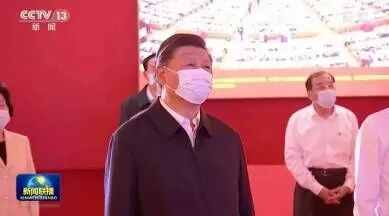
Xi Jinping visits party exhibition; makes first public appearance since SCO summit
text_fieldsBeijing: Xi Jinping, the president of China, visited a Communist Party exhibition on Tuesday, making his first public appearance since his return from the Shanghai Cooperation Organization (SCO) summit on September 16. His absence from the spotlight before the crucial Congress of the ruling party next month had sparked rumours.
According to the official Xinhua news agency, Xi visited an exhibition on Tuesday that highlighted the significant accomplishments of the Communist Party of China and the nation over the previous ten years.
Speaking at the exhibition, he called for concerted efforts to forge ahead determinedly toward a new victory of socialism with Chinese characteristics, the report said.
This is the first time that his public appearance has been covered by state media following his September 16 return from the SCO summit in Samarkand, Uzbekistan.
Observers say that Xi not being seen in public may have been due to seven days of mandatory quarantine in a designated place followed by a three-day homestay as per the official guidelines for those returning from abroad under the Dynamic Zero Covid policy, firmly advocated by Xi himself.
His absence sparked rumours of tensions within the CPC which is all set to hold its once-in-a-five-year Congress on October 16 in which 69-year-old Xi is widely expected to get endorsement for a record third term.
Scotching rumours and speculation over tensions within the CPC over Xi's continuation, the party on Sunday announced that all delegates totalling nearly 2,300 were "elected" for the Congress under the guidelines set by Xi.
A total of 2,296 delegates were "elected" to attend the upcoming 20th National Congress of the CPC to be held on October 16, the party said in a statement.
The delegates were elected under the guidance of Xi Jinping Thought on Socialism with Chinese Characteristics for a New Era and in accordance with the Party's Constitution, adopting methods required by the CPC Central Committee, it said.
The Congress, in which Xi is expected to get endorsed for an unprecedented third term, is being held amid a big purge of top security officials, stated to be part of a political clique opposed to the Chinese President.
Three security officials were sentenced to death with a two-year reprieve this week for corruption, raising eyebrows about the sudden surge of punishments ahead of the Congress.
Sun Lijun, former vice minister of public security who was accused of heading a political clique opposed to Xi, was sentenced to death on Friday with a two-year reprieve for taking bribes, manipulating the stock market and illegally possessing firearms by the Intermediate People's Court of Changchun in northeast China's Jilin Province.
A day before that the same court sentenced Fu Zhenghua, former Justice Minister and one of China's most powerful police chiefs, to death with a two-year reprieve for indulging in corruption amounting to USD 17.3 million and abuse of power, PTI reported.
Hours later, the same court gave a similar sentence to former Jiangsu official Wang Like. He was also sentenced to death with a two-year reprieve for bribery, conniving with criminal gangs and faking identity cards, official media here reported.
Since he came to power in 2012, Xi has carried out a shock and awe anti-corruption campaign in which over a million officials, including dozens of top military officers, were punished.
The CPC holds a Congress every five years. But this year's Congress is regarded as significant, as it is a leadership change year for the century-old party.
Xi, heading the party, the military and Presidency, is due to complete his 10-year tenure.
As per the norm widely followed since the death of party founder Mao Zedong in 1976, all of Xi's predecessors strictly followed a 10-year tenure keeping up with the directive of Mao's successor Deng Xiaoping.
Deng, regarded as Paramount Leader for his pragmatic social and economic policies introducing market reforms diluting socialist ideology, directed the leaders to strictly confine to a 10-year tenure to ensure the emergence of new and collective leadership to avert some of the excesses like the Cultural Revolution pursued by Mao in which millions of people were killed in the name of ideological experimentation.























